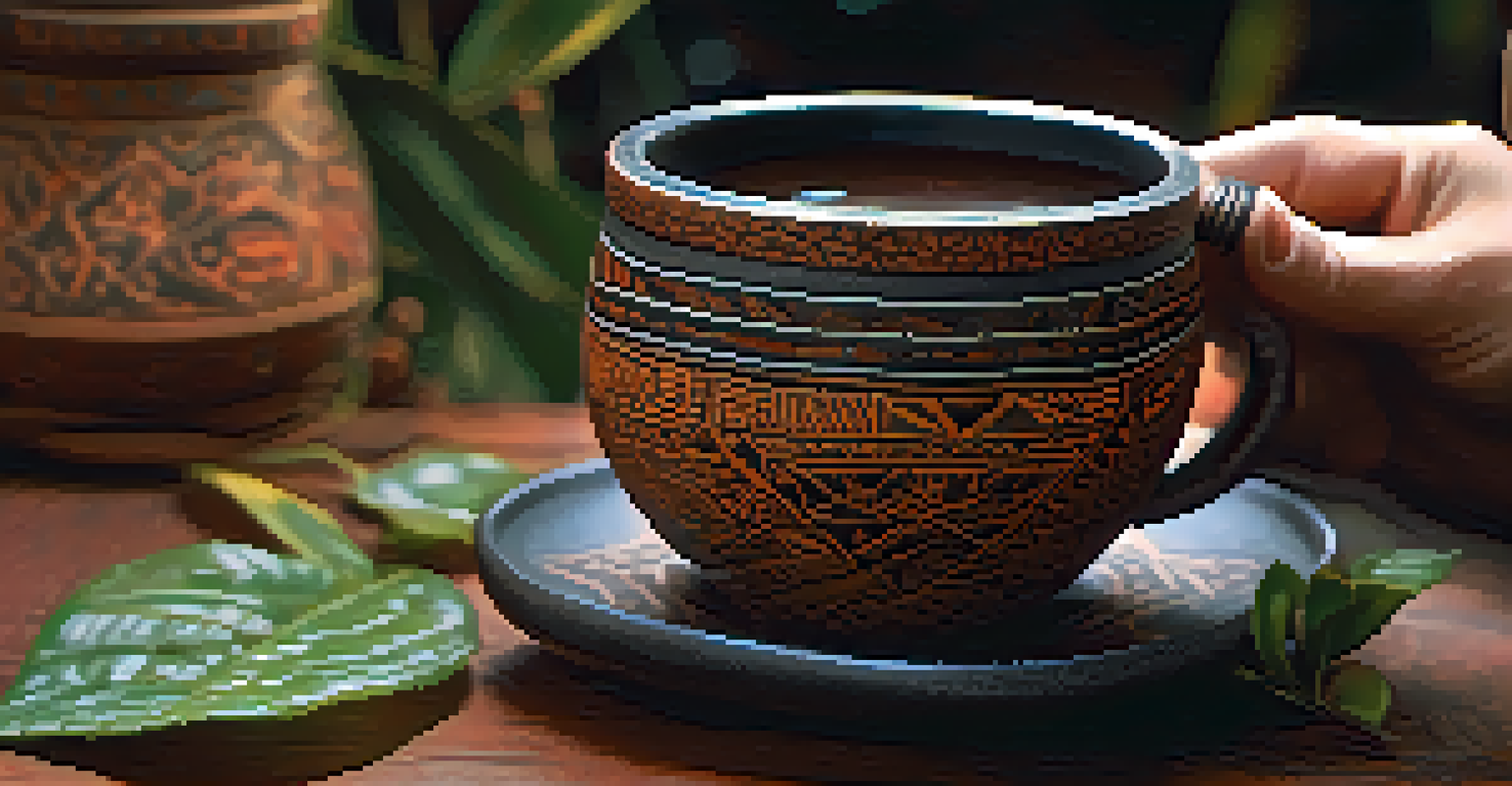Exploring Ayahuasca's Use in Treating Bipolar Disorder: Risks

Understanding Ayahuasca: A Brief Introduction
Ayahuasca is a traditional Amazonian brew made from the Banisteriopsis caapi vine and other plants. It contains the psychoactive compound DMT, which can induce powerful altered states of consciousness. People often seek ayahuasca for spiritual healing and personal insight, but its use is not without controversy, especially regarding mental health.
The mind is everything. What you think you become.
As more individuals turn to alternative therapies, ayahuasca has gained popularity in various cultures, often touted for its potential therapeutic benefits. However, understanding its effects on conditions like bipolar disorder is crucial, as the results can vary significantly from person to person. The complexity of bipolar disorder itself, characterized by extreme mood swings, makes this an area that requires careful consideration.
Given its potent effects, it’s essential for anyone considering ayahuasca to fully understand its nature and implications. While some may find relief or insights, others may experience exacerbated symptoms or harmful effects. This article explores the risks associated with ayahuasca use specifically for those with bipolar disorder.
The Potential Benefits of Ayahuasca for Mental Health
Advocates of ayahuasca often cite its potential to promote emotional healing and self-discovery. Some studies suggest that its use can lead to profound psychological insights and a better understanding of one’s emotions, which could be beneficial for some individuals with bipolar disorder. The experience may foster a sense of connection, reducing feelings of isolation that often accompany mental health struggles.

Furthermore, ayahuasca ceremonies are generally conducted in a supportive group setting, which can provide a sense of community and belonging. For individuals dealing with the challenges of bipolar disorder, this environment may encourage openness and sharing, potentially leading to therapeutic breakthroughs. However, it's important to note that these experiences can be intensely challenging and vary widely between participants.
Ayahuasca's Risks for Bipolar Patients
The use of ayahuasca can destabilize moods and trigger episodes in individuals with bipolar disorder.
That said, while some anecdotal evidence points to positive experiences, it’s vital to approach these claims with caution. The subjective nature of these experiences means they may not translate into consistent benefits for everyone. This calls for further research to substantiate any claims about the therapeutic effects of ayahuasca.
Risks of Ayahuasca for Individuals with Bipolar Disorder
One of the most significant risks of ayahuasca for those with bipolar disorder is the potential for mood destabilization. The intense psychological effects can trigger manic or depressive episodes, leading to a worsening of symptoms. For someone already vulnerable due to their condition, this unpredictability can be dangerous and may require hospitalization.
Healing takes courage, and we all have courage, even if we have to dig a little to find it.
Additionally, the experience of consuming ayahuasca can be emotionally overwhelming. It can unearth unresolved trauma or feelings, which may be particularly triggering for individuals with bipolar disorder. The processing of these emotions can lead to increased anxiety or distress, making the experience more harmful than healing.
Moreover, there is a lack of regulation and standardization in ayahuasca practices, which can add to the risks. Variability in brew potency, setting, and the experience of the facilitator can all impact outcomes. This unpredictability makes it essential for anyone considering ayahuasca to consult with healthcare professionals beforehand.
The Role of Professional Guidance in Ayahuasca Use
For individuals considering ayahuasca as a treatment option, seeking professional guidance is crucial. Mental health professionals can help assess whether ayahuasca could be a safe option given one’s specific circumstances. They can also provide ongoing support, which is critical should any adverse effects arise during or after the experience.
Moreover, professionals can help individuals develop coping strategies for potential emotional challenges that may surface during an ayahuasca journey. This proactive approach can make the experience less overwhelming and more manageable. It’s essential to have a solid support system in place for anyone with bipolar disorder considering this route.
Need for Professional Guidance
Consulting mental health professionals is crucial for those considering ayahuasca to ensure safety and support.
Involving healthcare providers in the decision-making process can also ensure that any other treatments or medications are considered. This holistic view of mental health care is vital to minimizing risks while maximizing the potential for positive outcomes.
Cultural Context of Ayahuasca Use
Understanding the cultural context of ayahuasca is essential when discussing its use. Traditionally, ayahuasca is utilized in indigenous Amazonian communities for spiritual purposes, guided by experienced shamans. This cultural significance is often overlooked when ayahuasca is used in Western settings, where it may be treated more as a recreational drug than a sacred practice.
In these traditional settings, the guidance of a shaman can play a crucial role in the safety and effectiveness of the experience. They help participants navigate the emotional and psychological challenges that arise during a ceremony. This element is often absent in Western contexts, which can increase the risks associated with usage for those with mental health issues.
Recognizing the importance of cultural context helps remind us that ayahuasca isn't a one-size-fits-all solution. The lack of cultural understanding and support can lead to misunderstandings and potentially harmful experiences, particularly for vulnerable populations like those with bipolar disorder.
Research and Evidence on Ayahuasca and Bipolar Disorder
Currently, research on ayahuasca's effects on bipolar disorder is limited, necessitating caution. While some studies indicate potential benefits for mood disorders, the specific impacts on bipolar disorder remain unclear. The complexity of the condition, with its unique mood fluctuations, makes it challenging to predict how ayahuasca might influence an individual’s mental state.
Moreover, most existing studies often focus on general mental health benefits rather than specific conditions like bipolar disorder. This lack of targeted research can lead to misinformation and unrealistic expectations. As a result, it is crucial for individuals to seek out credible information and not rely solely on anecdotal experiences when considering ayahuasca.
Cultural Context Matters
Understanding the traditional cultural practices around ayahuasca is essential to avoid misunderstandings and potential harm.
Future research will need to focus on understanding the direct effects of ayahuasca on bipolar disorder, including both potential benefits and risks. Until more is known, those with the condition should exercise caution and prioritize their mental health in their decision-making.
Conclusion: Navigating the Risks of Ayahuasca
In conclusion, while ayahuasca presents intriguing possibilities for emotional healing, it also carries significant risks, especially for individuals with bipolar disorder. Understanding these risks, alongside the potential benefits, is crucial for making informed decisions. The unpredictable nature of ayahuasca experiences can exacerbate existing mental health issues, making professional guidance essential.
As the interest in alternative therapies grows, it’s important to approach ayahuasca with an open mind but also with caution. Engaging in thorough research and seeking professional advice can help mitigate risks. Ultimately, prioritizing safety and mental well-being should be at the forefront of any exploration into ayahuasca use.

The journey towards mental health is deeply personal and varies for each individual. While ayahuasca may offer insights for some, it is not a substitute for comprehensive mental health care. As we continue to explore these complex relationships between alternative therapies and mental health, informed choices will lead the way.